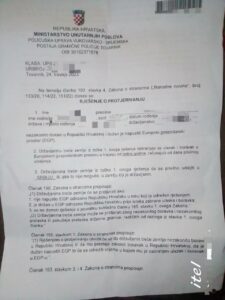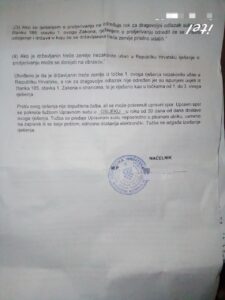I would have never left my country, but now my life there would be in danger
| 28.04.2023 | Šid, Serbia | No Name Kitchen | 45.155141, 19.174358 | Croatia | Serbia | yes | no | yes | yes | no | no | 17 - 23 | 6 | Afghanistan | detention, photos taken, personal information taken, papers signed, no translator present, denial of food/water | no violence used, threatening with guns | 3 Croatian male police officers wearing dark blue uniforms; 1 Croatian woman police officer wearing a light blue uniform; VW crafter prisoner transport (vehicle used to transport them to the police station); police car: citroen c-elysee 2017; unknown number of Croatian police officers present at the police station; unknown number of Serbian police officers in the pushback location; 1 blue Serbian police van. |
The respondent, an afghan 23-year-old man, explained that on the 25th of April around 4 pm a group of 6 people from Afghanistan, aged 17 to 23 started walking in the jungle (terms used to refer to forested areas) close to Šid and crossed the border into Croatia. While they were walking on the side of the main road, around 6 pm, a group of 4 people that the respondent identified as Croatian police officers arrived with a van and a car and stopped them.
They ordered them to stop, while loading their guns and aiming them at the group members to scare them and make them halt. Reportedly, the officers ordered the group to sit on the ground. Then, they requested the group members’ passports and any other document they had with them. When they answered that they did not have any documents, the officers asked for their Serbian camp cards. Other than that, they also took their mobile phones, power banks, bags, and money.
Then, the respondent recalled that the officers loaded them in the van and drove them to a police station. They were not able to remember where the police station was, or to identify it. The transportation lasted for about 7 minutes, after which the van stopped in front of the police station for another 25 minutes. The vehicle was described by the respondent as a van without side windows and there were two small, closed grills on the roof.
The respondent said that the police station looked like “a deportation center”, where people are kept, where paperwork is done, and from where people are deported. At the police station, the respondent recalled that they were locked all together in a room similar to a prison cell, with one bed and a toilet.
Here, reportedly, the officers called the detainees into an office one by one: there, they had to state their name, nationality, and other personal information. This information was then written on a piece of paper, which the group members had to hold up in front of their chest while a photo of them was being taken. When asked by the officers where they were going, they replied that they were going to France because they had relatives there.
Then, the respondent stated that the group members had to sign a "Decision of expulsion" paper in Croatian. After they had signed, the paper was translated with a translator app into Pashto as, during all this time, there was no translator present. Afterwards, the respondent reported that a copy of the paper that they had signed was given to all of them.


According to the respondent, the same night, two of the six people were brought back to Serbia. The other members of the group had to stay in the room for two more days. No food was provided, and the officers told them that if they wanted to eat, they had to pay. The respondent said that it was very difficult in the police station because there was just one bed where two people were sleeping, and the other two were sleeping on the floor.
The respondent added that the officers told the group members that they would be taken to a train station, from where they could take the train, but instead they were eventually brought back to Serbia. At 10am on the 28th of April, the group was taken back to Serbia in a van by two officers. The drive took around 15-20 minutes. When the officers released the group members, their bags and phones were given back to them. At the Serbian border, the Croatian officers handed the group members over to some people that the respondent identified as Serbian police officers.
According to the respondent, there were many Serbian officers present at the border, but he could not remember the exact number. Three of which approach the transit group and body searched all of them; then they made a phone call (the respondent thought that they were calling other officers to come and pick them up with a vehicle). When a blue van arrived, the group was loaded inside and brought back to Šid.
Europe is participating in the war in Afghanistan. People are leaving Afghanistan because it is now a dangerous country and there is war. For this reason, Europe should help Afghan people that are leaving the country. If there was no war, I would have never left my country, but now my life there would be in danger. We all live in the same world, one world.
